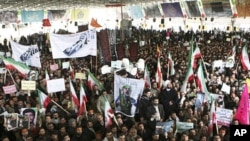Since the beginning of this year, a number of Arab states have experienced protests and calls for significant reforms. Two of these nations, Tunisia and Egypt, saw their leaders toppled. Meanwhile, Iran has seen very little recent public dissent against its regime despite massive protests two years ago after a controversial presidential election. In Washington, scholars gathered recently to discuss why Iran has not seen a so-called "Spring" of change.
In recent months, protesters have filled the streets of Tunis, of Cairo, Manama, Sana'a, and Damascus.
But not the streets of Tehran. Only two years ago, Iran's presidential election sent tens of thousands into the streets demanding change and accountability. For a short time this February there were some pro-democracy protests. But today, they're not visible.
A recent symposium in Washington explored the reasons for this. Former Italian ambassador to Iran Roberto Toscano, who is now with the Woodrow Wilson Center, explained why Iran's iron-clad regime has made it difficult, so far, for the opposition to succeed.
"The bad news is that no democratic movement has ever prevailed against a unified armed force," Toscano said.
Iran's military, its Revolutionary Guards, and its security apparatus, including the paramilitary Basij militia, remain firmly in the government's control.
George Mason University professor Shaul Bakhash pointed out that the two most visible Iranian opposition figures, Mir Hossein Musavi and Mehdi Karroubi, remain under house arrest, preventing them from directly engaging and energizing opposition forces. Bakhash said tales of stiff jail sentencing and harsh prison treatment leave people who oppose the government intimidated.
"I think there are enough credible reports of deliberate mistreatment of men and women in prison, including rapes, to make clear that this is what will happen to you if you continue in dissent and opposition," Bakhash said.
During the two years since Iran's presidential election, there has been a wave of arrests, trials, and imprisonments. But Ambassador Toscano says the government's behavior, while intended to create fear, also points to its weakness.
"The good news is that repression alone cannot guarantee the continuation of any regime. If the regime loses support to the extent that it has to rely only on repression, then its future looks very dim," Toscano said.
But another Iran analyst, RAND Corporation's Ali Reza Nader, says there are several factors why repression by the state will not protect it forever.
"Number one is the ever-expanding public dissatisfaction with the system. The second one is internal divisions within the political system in Iran. And, we see more of those every day. And the third is the lack of legitimacy. I think the Islamic Republic lacks legitimacy not only among the population, but also, within the elite," Nader said.
Still, Ambassador Toscano says that even though cracks are widening in the regime, change is prevented through a concept called Velyat e-Faqi - ultimate authority resting with the Supreme Leader.
The Velyat e-Faqi is not compatible with any sort of democracy - gradual, partial, whatever. The only hope - we talk about the demise [of the presence and the power of the Supreme Leader] - looking at the constitution, the Iranian constitution, you see the possibility of replacing the Supreme Leader with a council," Toscano said.
Today, the Iranian government projects an image of total control. The quiet streets of Tehran and other cities are, to regime supporters, proof of that. But analyst Nader says a backlash lies beneath that surface.
"I think the reality is quite different. I think what we are witnessing in Iran today is really the calm before the storm," Nader said.
Scholars Ponder Question: Why Not an Iran Spring?




